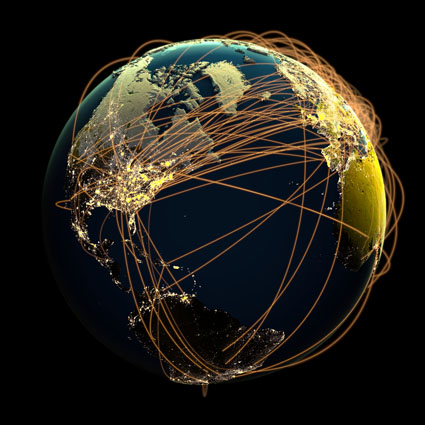Personal Wealth Management / Economics
Is Globalization in Retreat?
Before we presume that half a century of building economic ties is unraveling, let's consider what is talk and what is action.

Will these connections soon be broken? Image by 3alexd/iStock.
A common theme in 2016: Protectionism is rising, with potentially devastating consequences for the world economy. Some cite rising trade barriers and protectionist measures around the world. Brexit, to others, was a vote against the global economy. Floundering multilateral trade deals, many argue, show the tide has turned against trade between nations. And now, on top of it all, Donald Trump-a candidate who preached ditching the Trans-Pacific Partnership (TPP) and renegotiating the North American Free-Trade Agreement (NAFTA)-has won the US presidency. Hence, many fear the world's increasingly global supply chain is about to break apart, rocking the world economy and stocks. But before you presume protectionism is destined to rise, let's consider what's talk and what's action; what is known, and what is a mere projection of politicized rhetoric.
It is true enough that protectionist rhetoric is rising lately, and if this became a reality on a large enough scale, it could be quite negative. Globalization[i] isn't a permanent phenomenon that advances interminably, regardless of policymakers' decisions. If it were meaningfully disrupted, supply chains could be impacted, profits could fall, consumer and producer prices could rise and a host of negative factors could come home to roost.[ii] Illustrating how intertwined the global economy is these days, consider Exhibit 1, which is a short list of the top five most American cars on the market by components (i.e., wheels, electronic components and such):
Exhibit 1: The Top Five Cars by Components Made in America
- Toyota Camry
- Honda Accord
- Toyota Sienna
- Honda Odyssey
- Honda Pilot
Source: Cars.com, American-Made Index 2016.
You could say the same of many countries, and it isn't just in the car market. Little is 100% sourced in the nation that stamps "Made in _____" (insert nation of your choosing in the blank) on the final product. Reversing these connections could be problematic; this risk of protectionism is real.
According to the World Trade Organization's (WTO) July report, WTO members have enacted 2,800 trade-restrictive measures since October 2008, and only 25% have been repealed. In the period between mid-October 2015 and mid-May 2016, members enacted 22 restrictions per month. The WTO's measure only dates back to 2008, so it's hard to get a sense of history here, but WTO Director-General Roberto Azevêdo noted it's the highest rate since 2011. However, he also noted WTO members enacted 19 trade liberalizations per month in that same period. Obviously, this suggests protectionist actions are up and on net exceeding liberalizations, but the huge majority of these (see the WTO's database here) are very narrow in nature. Many target China's steel industry, an issue ongoing for literally years. Many of the rest aren't good, but Chile slapping a tariff on imports of steel nails is pretty unlikely to be crisis-inducing and likely hits Chilean carpenters hardest. You can create your own joke about the hammer hitting the nail, or the carpenter's thumb, here.
While those actions range from modestly annoying to economically inefficient, Canada and the European Union recently inked a sweeping free-trade deal known as the Comprehensive Economic and Trade Agreement (CETA). CETA may be the most sweeping, deepest trade deal ever dreamt up. It isn't a done deal yet, as national parliaments must approve it and legal challenges may linger, but should the momentum carry forward, tariffs and trade barriers on 99% of goods and many services are poised to vanish as it is implemented. This easily exceeds NAFTA and the proposed (but unlikely to pass-more on that momentarily) TPP. CETA is a strong rebuke to media theorizing that "globalization is in retreat."
It didn't come easy-such big, multilateral deals rarely do! Talks began on May 6, 2009, concluding over two years ago. EU rules require all 28 governments to approve such treaties, and economic and political interests across the 28 aren't uniform. One such country, a microcosm of the broader bloc, is Belgium. Belgium's national government needs unanimity among the provinces to cast its vote for a deal. Recently, when the French-speaking southern region, Wallonia (the alleged birthplace of french fries-one heck of an export), objected, it threw a monkey wrench into the deal. Many thought CETA dead-a symbol of faltering free trade, not an expansion of it.
Wallonia is a stereotypical place negatively impacted by trade: massive industrial job losses; closed factories and mills; graffiti; low incomes and high unemployment. (It is now how many viewed my hometown, Pittsburgh, Pennsylvania, when I grew up decades ago.) Concerns, including worries over local farmers and businesses, ran deep. If Wallonia stuck to its guns, it could have upended seven years of trade diplomacy. However, the Belgian government offered increased benefits for Walloon farmers and the region flipped, clearing the way for the deal to advance.
That, folks, is action on trade, and it is in the "freer" direction. Most of what you hear is talk. Take Brexit for example. Brexit isn't inherently a vote against globalization at all. Stop. Re-read that sentence. Yes, sure, there may be a group of Brexiteers who are anti-trade. But most Brits seem to want to retain free trade with the EU's single market. Moreover, one pro-Brexit sales pitch was that it would free Britain from the need to get 27 other nations on board with trade deals! Which Prime Minister Theresa May is actively trying to execute on. Perhaps that proves true and perhaps it doesn't, but it is odd to view Brexit as a rejection of world trade. Whatever your view of the vote or justification for it, if talks conclude with British firms maintaining access to the EU's single market, is Brexit a setback for globalization or a nothing? I'd argue the latter, and the fact is both sides have incentives to reach that conclusion, given huge cross-Channel interconnectedness.
Perhaps, as some suggest, CETA is a one-off, and other big deals like TPP and the Transatlantic Trade and Investment Partnership (TTIP, the proposed pact between the US and EU) will fall apart. But I'm not so sure either are such clear evidence of a sea change in global sentiment. We've argued for years on these pages neither is likely to pass anytime soon. Before Donald Trump took the presidency and before Clinton figured out the public didn't think TPP was such a "gold standard" deal. Multi-lateral deals are always difficult to achieve. TPP involves 12 countries, and any negotiation with the EU is inherently multilateral (see CETA). This is the same reason the Doha round of world trade talks took forever and resulted in little; it is why virtually every "big" negotiation ever takes years to execute, if it happens at all. Heck, it took years for the US' bilateral deals with Korea and Colombia to come to fruition, even after talks were done. The kicker, though, is that whatever happens with TPP and TTIP, it doesn't mean globalization is retreating so much as standing still-not advancing isn't synonymous with moving backwards.
Which brings me to President-elect Trump. In this year's presidential race, his rhetoric certainly was anti-trade, arguing for a NAFTA renegotiation and tariffs on China. But, again, rhetoric isn't action! Bill Clinton was lukewarm about NAFTA in 1992's campaign (it was negotiated by his principal competitor, George H.W. Bush), then saw it through Congress the next year. In 2008's presidential primaries, Barack Obama argued NAFTA should be renegotiated because it didn't work for American workers. When questioned, he and his campaign argued there was no way Canada and Mexico would walk away from the bargaining table. That is exactly what Trump said! Eight years later, Obama has done nothing to renegotiate NAFTA[iii], signed the Korea and Colombia deals, cites Trump's rhetoric as irresponsible and backs the Trans-Pacific Partnership. It isn't just him! Democrats and Republicans vying for office frequently argue China manipulates its currency and should be punished with tariffs-it's an election year tradition. Mitt Romney did it in 2012. Obama did that, too, in 2008! But today, Donald Trump's tough talk on China is presumed to be deadly serious. Remember: All talk is cheap, but politicians' campaign trail talk frequently has the same value as Bernie Madoff's returns.
Maybe Donald Trump is more sincere in his anti-trade stance. Trade is an area of American policy that the president has some unilateral control over, so it is worth watching. But at this point, assuming we're going to roll back half a century of global connections between businesses and countries and cause a protectionism-driven recession is premature. It's one reason why we'd suggest fear of Trump may exceed reality post-inauguration-setting up markets for a positive surprise. Watch if you like-I suggest you do!-but let's be clear, speculation today about globalization's collapse is just that. Speculation.
If you would like to contact the editors responsible for this article, please message MarketMinder directly.
*The content contained in this article represents only the opinions and viewpoints of the Fisher Investments editorial staff.
Get a weekly roundup of our market insights
Sign up for our weekly e-mail newsletter.

You Imagine Your Future. We Help You Get There.
Are you ready to start your journey to a better financial future?

Where Might the Market Go Next?
Confidently tackle the market’s ups and downs with independent research and analysis that tells you where we think stocks are headed—and why.





